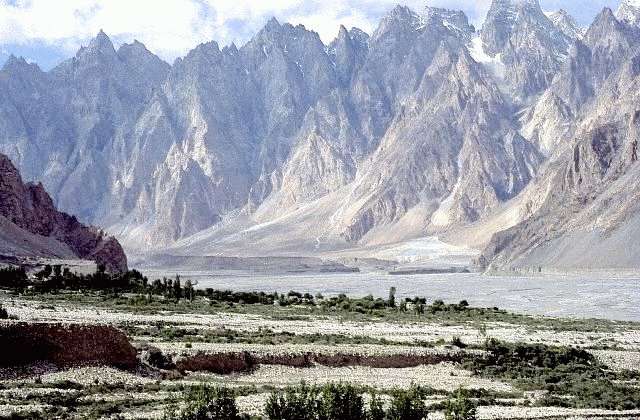FWP:
SETS == WORDPLAY
GRANDIOSITY: {5,3}
For the first line, there are two possible readings. They are grammatically different-- since (1a) takes ho as a familiar (or intimate) imperative, while (1b) takes it as an abstract future subjunctive-- and so perhaps offer slightly different approaches to the verse. But they aren't really different enough to be of great significance.
The grandiose elaboration of the first line, with its four iẓāfat constructions (I'm surprised that the commentators don't complain about them), seems meant to overawe. The line is full of exotic words and lofty concepts. Outstanding among them is binā (see the definition above), which means 'building' in a sense, but far more commonly the base or foundation for a building. So we envision the 'summit', or highest point, of the 'foundation', or lowest point, of an edifice. This edifice is apparently truly lofty, because the second line confirms that it's a bulandī , a 'height'. An edifice of which even the foundation is at a lofty height could well intoxicate one with pride.
But alas, the edifice is only that of the ʿālam-e imkāñ , the 'realm' (or world, or state) of 'possibility' (or contingency). How quickly possibilities leap in the imagination from lofty origins to even loftier summits! This realm exists lavishly in our minds, and even exists to some extent in this contingent, doomed world of ours. It's hard for us not to be at least wistfully and hopefully proud of it.
But the second line, unlike the first, is punchy, concise, and colloquial. This 'height', however real is seems (or perhaps actually is) right now, is doomed-- it is fated to experience 'lowness', one day, as the traditional wheel of fortune turns. The predicted downfall can apply either to the 'height' of grandiose human pride (a loftiness that is destined to be brought low one day), and/or to the 'pride' of people who plume themselves on it (an arrogance that is destined to be humiliated one day). For the bulandī (see the definition above) can apply to either or both.
For an elegant, evocative use of a dasht-e imkāñ ,
see {4,8x}.

Nazm:
In this verse, the beauty of the refrain is that by 'one day' Doomsday is meant. (89)
== Nazm page 89